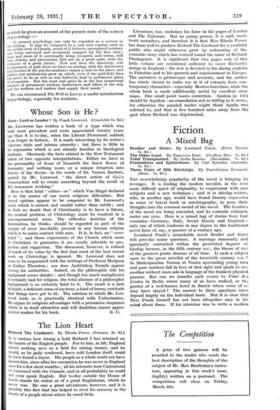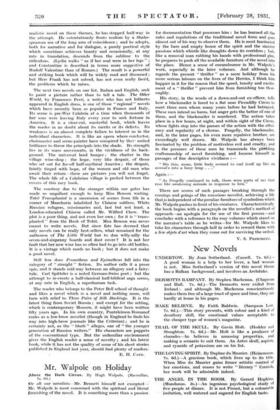Fiction
A Mixed Bag
Three Pairs of Silk Stockings. By Panteleimon Romanof. (Dent. 7s. 6d.)
THE overwhelming popularity of the novel is bringing its revenges. It is leading the modern novelist, in the ever
more difficult quest of originality, to experiment with new subjects and a new technique ; and it is driving writers, who, in another age, would have found literary expression in essay or travel book or autobiography, to pour their thoughts into the common mould of the novel. The frontiers of the novel are being extended, and its contents enlarged, under our eyes. Here is a mixed bag of stories from four countries—Germany, Italy, Soviet Russia and England— only one of which conforms in any degree to the traditional novel form of, say, a quarter of a century ago.
Leonhard Frank's remarkable novel Brother and Sister will provoke many questions. A marriage innocently and ignorantly contracted within the prohibited degrees of kinship became, in the fifth century "Lc., the theme of on3 of the greatest poetic dramas of all time. Is such a subject open to the prose novelist of the twentieth century A.D.? In Shakespearian Verona or Venice upstanding young men and pure maidens fall in love at first sight and speak to on3 another without more ado in language of the frankest physical passion. But can we transfer such scenes to Unter de3 Linden in Berlin where many of us have walked, or tha garden of a well-known hotel in Zurich where some of U 4 may have stayed ? The answer to these questions must depend largely on the individual taste. But it is clear that Herr Frank himself has not been altogether easy in his mind about them. If his intention was to write a modern
realistic novel on these themes, he has stopped half-way in the attempt. He ostentatiously Routs realism by a Shake- spearean use of the long arm of coincidence ; and he adopts, both for narrative and for dialogue, a purely poetical style which sometimes achieves beauty and occasionally, at any rate in translation, descends from the sublime to the ridiculous. (Lydia walks "as if her soul were in her legs " ; and Constantine is described in terms more suggestive of Rudolf Valentino than of Romeo.) The result is a powerful and striking book which will be widely read and discussed ; but Herr Frank has not solved, has not even really faced, the problems which he raises.
The next two novels on our list, Italian and English, seek to paint a picture rather than to tell a tale. The Other World, by Francesco Perri, a writer who has not hitherto appeared in English dress, is one of those " regional " novels which have recently been so popular in France and Italy. Its scene is pre-War Calabria at a time when thousands of her sons were leaving Italy every year to seek fortune in America. It is a clear-cut, masterful book, which leaves the reader in no doubt about its merits or its defects. Its weakness is an almost complete failure to interest us in the individual characters. It is like an opera where conductor, choirmaster and scene-painter have conspired by their united brilliance to throw the principals into the shade. Its strength lies in its mass movements, in the vividness of its back- ground. The universal land hunger ; the chatter in the village wine-shop ; the hope, very like despair, of those who set out for far-off half-mythical America ; the despair, faintly tinged with hope, of the women and old men who await their return—these are pictures you will not forget. The whole life of a Calabrian village is packed between the covers of this racy book.
The courtesy due to the stranger within our gates has made us ungallant enough to keep Miss Benson waiting. Tolnt Transplanted is a succession of scenes from life in a corner of Manchuria inhabited by Chinese soldiers, White Russian refugees, missionaries and, last but not least, a London-educated Chinese called Mr. Wilfred Chew. The plot is a poor thing, and not even her own ; for it is " trans- planted " from the Book of Tobit. Miss Benson was never meant to write novels. But since fate has decreed that only novels can be really best-sellers, what remained for the authoress of The Little World but to don willy-nilly the seven-and-sixpenny boards and dust cover ? It is not her fault that her new wine has so often had to go into old bottles. It is a vintage which needs no bush ; but it does not make a good novel.
Still less does Prometheus and Epimetheus fall into the category of " straight " fiction. Its author calls it a prose epic, and it stands mid-way between an allegory and a fairy- tale. Carl Spitteler is a noted German-Swiss poet ; but the attempt to re-create a half-classical half-biblical saga seems, at any rate in English, a superhuman task.
The reader who belongs to the Peter Bell school of thought and likes a novel which is a novel and nothing more, will turn with relief to Three Pairs of Silk Stockings. It is the latest thing from Soviet Russia ; and except for the setting, which is contemporary Moscow, it might have been written fifty years ago. In his own country, Pantelehnon Romanof ranks as a low-brow novelist (though in England he finds his way into high-brow journals like the Criterion) ; and he is certainly not, as the " blurb " alleges, one of "the younger generation of Russian writers." His characters are puppets of the conventional type. But the unfamiliar environment gives the English reader a sense of novelty ; and his latest book, while it has not the quality of some of his short stories published in England last year, should find plenty of readers.'
E. H. CARR.












































 Previous page
Previous page